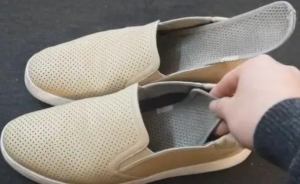
The slipping of an insole backwards can be caused by several factors, including:
1. Incorrect sizing
If the insole is too large for your shoe size, it may not fit properly and could move around inside your shoe, leading to slippage.
2. Poor adhesive or worn-out grips
Insoles usually have adhesive or grips on the underside to keep them in place. Over time, these adhesives may wear off or lose their stickiness, causing the insole to slip.
3. Sweaty feet
Excessive perspiration can make your feet damp, reducing friction between the insole and your foot. This lack of friction can cause the insole to slide backward as you walk or run.
4. Foot movement and gait patterns
Some individuals have a more pronounced heel lift or foot movement during their gait cycle, which can contribute to the insole slipping backward.
To prevent insole slipping, you can try the following solutions:
1. Ensure proper fit
Use insoles that are specifically designed for your shoe size. Trim the insole if necessary to match the shape of your shoe.
2. Replace worn-out insoles
Over time, the adhesive or grips on insoles can wear out. If your current insoles are old or no longer sticky, consider replacing them with new ones.
3. Use double-sided tape
If the insole constantly slips, you can apply double-sided tape to the underside of the insole. The tape will add extra grip and help keep the insole securely in place.
4. Moisture-wicking socks or powders
Wearing moisture-wicking socks or using foot powders can help reduce excessive sweating and keep your feet dryer, reducing the likelihood of slippage.
5. Consider different insole materials
Some insoles are made from materials with better grip properties. Experimenting with different materials might provide a better fit and reduce slippage.
If the slipping issue persists despite trying these solutions, it may be helpful to consult with a podiatrist or footwear specialist for further evaluation and guidance.
